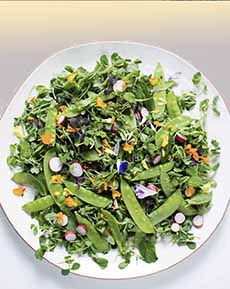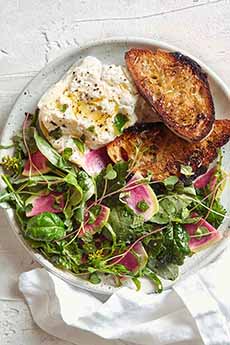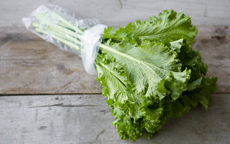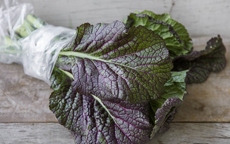It’s Spring: Create A Spring Salad Recipe
|
Does the spring salad recipe in photo #1 look complicated? It couldn’t be easier. So start your celebration of spring with a lively spring salad. Photo #1 is a simple mixture of: > The history of salad. What makes a salad a “spring” salad? It’s tender, has a splash of color beyond green, and uses ingredients that come into season in spring, delivering something beyond wwinter’s mix of celery, cucumbers, carrots, iceberg and romaine lettuces, mushrooms, onions, and Red Globe radishes. These include: > Check out this list of spring vegetables and fruits. In the “olden days” prior to the 1970s or thereabouts, produce was seasonal. Green peas were the products of spring, as were asparagus, green beans, and other items on the spring produce list. Now, in-demand produce is available year-round, whether greenhouse-grown or imported from the Southern Hemisphere, where the seasons are opposite ours (carbon miles be damned). You may have noticed in the packaged salad section of your produce department a blend called “spring mix.” In general, a spring mix usually contains tender baby lettuces and baby spinach. It may also include red and green romaine, red and green oak leaf lettuce, other heirloom lettuces, chard, arugula, endive, and radicchio. Spring mix is normally harvested at a very young age, while the greens are still small and tender [source]. Don’t hesitate to try something new. If you’re a fan of spring peas, you’ll be delighted by the taste of pea shoots (photo #4), pea greens, and pea blossoms. The best place to find exciting ingredients is a farmers market, followed by a specialty produce store.
________________ *There are only winter and summer truffles. Here’s more about them. †While capers and caperberries are plucked from the bush beginning in May, they are typically pickled and thus available year-round. They go so well with fish and spring produce. ‡Dandelion greens are actually a weed, but one that packs in lots of vitamins and minerals (a great source of vitamins A, C, and K, calcium, folate, and potassium). They may be the most nutritionally dense green you can eat, outstripping kale and spinach. Dandelion greens have a potent flavor that mellows when cooked. They can be eaten raw, braised, steamed, and used in place of spinach [source]. |
| |
|
CHECK OUT WHAT’S HAPPENING ON OUR HOME PAGE, THENIBBLE.COM.
|
||









